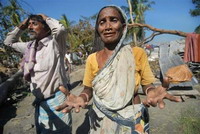Shortages of food at crowded relief camps cause fights among cyclone survivors
Cyclone-ravaged Bangladesh is in need of international aid, because shortages of food at crowded relief camps triggered fist fights among survivors.

The government said it had promises of US$390 million (263 million EUR) in international aid, much of it from a US$250 million (170 million EUR) pledge from the World Bank.
But aid workers in remote villages struggled to get desperately needed basic goods such as rice, clean drinking water and tents to survivors of last Thursday's storm, which killed more than 3,100 people and left tens of thousands homeless.
In Tafalbari, a dusty village of crushed tin huts and flooded fields, violence broke out outside a relief center as desperate villagers fought each other after hours of waiting fruitlessly for aid.
Several thousand people surrounded a small relief station set up by a local aid agency that was forced to shut its gates, admitting just a few people at a time.
"I didn't have enough food before the storm hit," said Juddistir Chandar Das, 45, who lost the home he shared with his wife and three children. "We have hardly eaten at all since the storm."
In neighboring Purba Saralia, relief officials used batons to fend off a crush of hungry people waiting for a rice handout.
"I've been waiting since dawn. I have nothing to eat and my children are hungry," said Kabir Howlader, 25, one of thousands of people who gathered at the local fire station, which has been converted into an emergency relief center.
Officials at the center said the government had provided enough rice to feed 1,200 registered residents, but there were far more people outside the gates.
With many drinking water wells destroyed by the cyclone, the need for clean water was becoming critical to ward off deadly waterborne diseases.
"We are concerned about diarrhea," said Renata Dessallien, the top U.N. official in Bangladesh. "There is no question this will be a problem."
Health workers were distributing water purification tablets along with safe drinking water, said Mohammad Abdul Baset, a government health official in the town of Barisal.
"The problem is that aid workers need hours to reach these remote areas. Poor communications are also hampering our work," said Anwarul Huq, a spokesman for the Bangladesh Rural Advancement Committee, the country's largest nonprofit development organization.
In many places, aid workers had to clear fallen trees and debris to get to survivors, said Huq, adding that rescuers also were facing a shortage of boats.
The World Bank announced it will provide US$250 million (170 million EUR) - consisting of a low-interest loan and a grant - to support both immediate needs such as food, medical care and small loans for fishermen and farmers, and longer-term recovery projects.
Earlier, the European Commission announced US$9.6 million (6.5 million EUR) in aid. The American Red Cross said it would provide US$1.2 million (819,000 EUR) to help get clean water to the survivors and build emergency shelters.
The official death toll stood at 3,167, Lt. Col. Main Ullah Chowdhury, spokesman for the army that is coordinating the relief and rescue work, said Wednesday.
The Disaster Management Ministry said 1,724 people were missing and 28,188 people had been injured.
Nearly 4 million people have been affected by the cyclone, which destroyed 458,804 houses. Another 665,529 houses have been partially damaged, the ministry said.
Local media reports say more than 4,000 people may have been killed. The Bangladesh Red Crescent Society, the Islamic equivalent of the Red Cross, has suggested the final figure could be around 10,000.
Subscribe to Pravda.Ru Telegram channel, Facebook, RSS!



